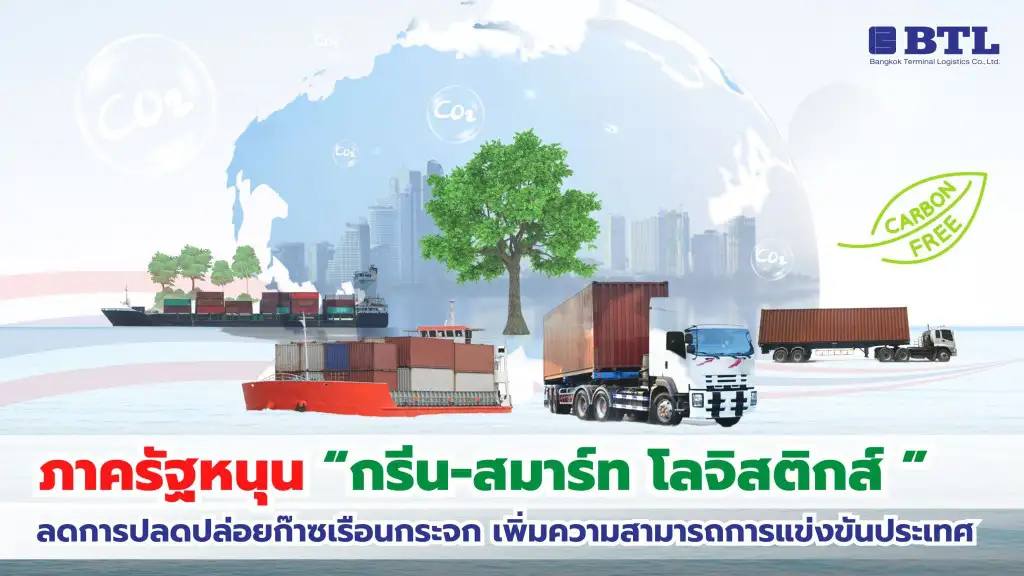



Aiming to develop into green logistics to meet the challenge of reducing greenhouse gas emissions.
The transportation and logistics service industry is one of the future industries and services that will help drive Thailand towards becoming a developed country.
With innovation and technology, Thailand has been ranked 34th out of 139 countries in the World Bank’s International Logistics Performance Index (LPI), down from 32nd in 2018, and is ranked 3rd in the ASEAN region, after Singapore and Malaysia.
Mr. Phusit Rattanakul Sereerangrit, Director-General of the Department of International Trade Promotion, Ministry of Commerce, said that in the past, the government has given great importance to the logistics business.
With the aim of developing Thailand to become the logistics hub of the ASEAN region, a variety of policies have been set to promote this in line with the development of the 20-year national strategy, item 3, in terms of enhancing Thailand’s competitiveness.
The logistics business is one of the target industries that the government has given importance to in the 13th National Economic and Social Development Plan, which focuses on developing infrastructure and various factors that will help develop the logistics system and transportation system to be seamlessly connected.
Both at the regional, sub-regional and border levels, the Ministry of Commerce places importance on developing the potential of entrepreneurs to become new-age entrepreneurs. The Department of Promotion has organized many activities to increase the efficiency of entrepreneurs and logistics service providers.
best practice and trying to create networks for both domestic and international entrepreneurs
Digital: New challenges for logistics
Mr. Suwit Rattanachinda, President of the Logistics Service Providers Association, said that digital is a new challenge for the world because today the world has changed completely, both in terms of digital platforms and climate change.
This is a challenge for entrepreneurs in creating smart and green logistics. Smart logistics is about developing platforms, such as warehouses using smart warehouse systems to enhance service efficiency.
This includes setting up a platform for electronic license applications in 37 agencies, which is something the public and private sectors must prepare to handle. Next is green logistics , because the logistics business itself is another cause of global warming, which all sectors in this business must accept.
Especially in trucking, we need to change from unfriendly energy to more friendly energy, such as changing from combustion engine trucks to electric trucks, as the whole world tends to use more electricity . Finally, we need to be aware of the way the world is changing, especially in terms of smart and green.
The latest at TILOG-LOGISTIX 2023 , held from 17-19 August 2023 by the Department of International Trade Promotion in collaboration with RX Tradex at BITEC, Hall 98.
There will be 415 brands from 25 countries around the world showcasing their technologies, innovations, solutions and logistics services, along with knowledge-enhancing activities and international academic seminars. The event expects over 9,000 visitors and aims for over 4 billion baht in business negotiations.
Ms. Waraporn Thammacharee, Managing Director of RX Tradex, said that TILOG-LOGISTIX 2023 is organized under the concept of Smart and Green Logistics for Sustainable Tomorrow, driving Thai businesses towards a green future with smart logistics that protects the environment.
Focus on adapting to the global trend of environmental conservation with new logistics technology, encouraging entrepreneurs to adapt under the concept of green.
The event also showcases innovations and technologies that meet the needs of digital logistics, helping to reduce costs and increase efficiency in logistics management, such as product transportation route planning and management systems, warehouse management systems, security, as well as smart warehouse systems that use solar energy, robots that can move freely in all directions in the warehouse, and forklifts powered by lithium batteries.
Mr. Kongrit Chantrik, Executive Director of the Thai National Shippers’ Council, said as a service user about his expectations for logistics service providers that logistics service providers (LSPs) should improve their services to be more efficient.
By developing service solution models, investing in platforms, and implementing technologies, especially automation systems, to better connect with customers, and help users conduct business under increasingly complex measures, especially the EU’s environmental trade measures such as CBAM, which is the EU’s pre-border carbon price adjustment measure, which will start with the current 7 product groups and will expand to other product categories in the next 2-3 years.
Including other countries such as the United States, Japan or China, they will also follow such measures. For this reason, service users themselves must quickly adapt. For example, factories are looking for alternative energy sources to use. But what we are trying to move forward with now is solving problems together among those involved, whether they are logistics operators or warehouses, etc. Because we have to find a strategic partnership that is not just about throwing problems at them, but we have to discuss together and find a way forward that will allow both exporters to meet the needs of downstream traders and service providers.
Logistics can grow
In addition, the focus is on total logistics solutions and building a strong logistics network that allows users to track the products from the factory to the recipient, as well as providing alternative transportation options when problems arise.
Another important issue is technology that will help inform users that they are aware of and can quickly solve problems. It has been developed into a trade facilitation platform that links applications or platforms of each company together. If everything can be linked together, it will create peace of mind for users because the platform will connect all sectors together in the end.
Thailand’s logistics costs account for 14% of overall GDP, while in developed countries it is 10% or less, so costs must be reduced to remain competitive.
However, many predict that in 2023, Thailand’s logistics sector will expand further as the COVID-19 situation improves in many countries and the popularity of e-commerce continues to grow.
The growth trend of the new era logistics business will not only focus on generating returns from doing business alone, but will also use various modern technologies to further develop into “smart logistics”.
And also aiming to develop into “green logistics” to respond to the need to reduce greenhouse gas emissions.
Source of information: Prachachat Business
————————–
https://www.prachachat.net/economy/news-1364750
Contact us for BTL service inquiries
02-681-2005 to 9